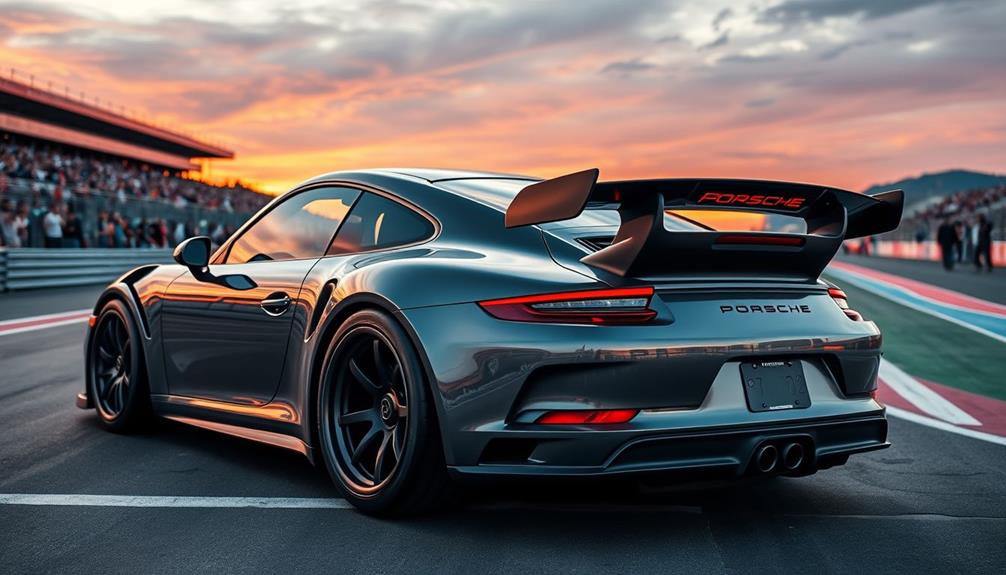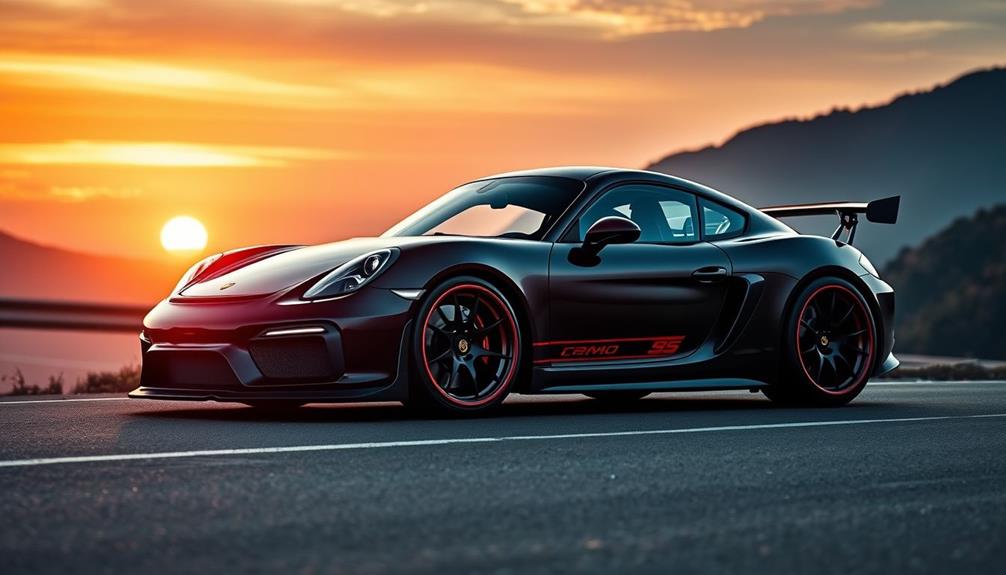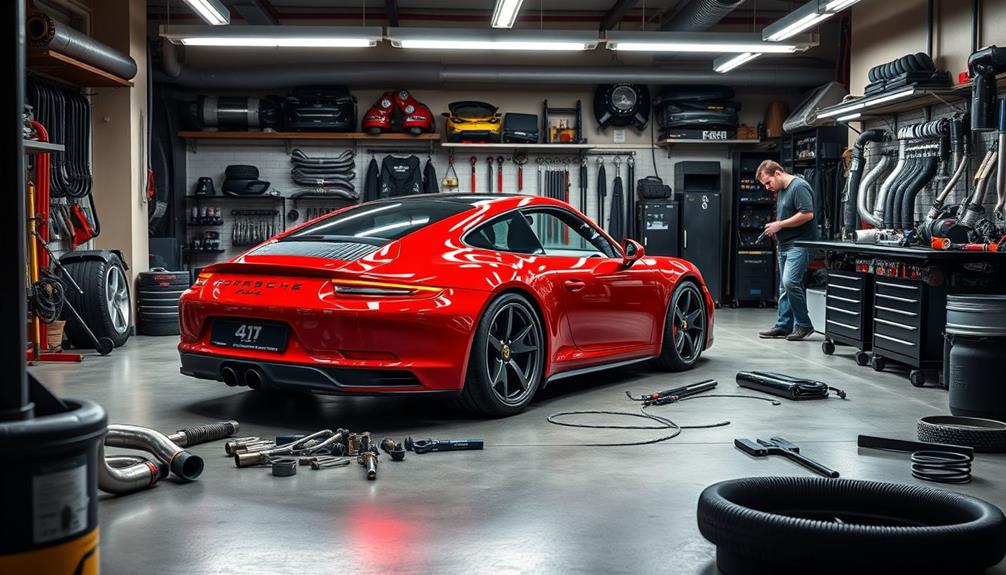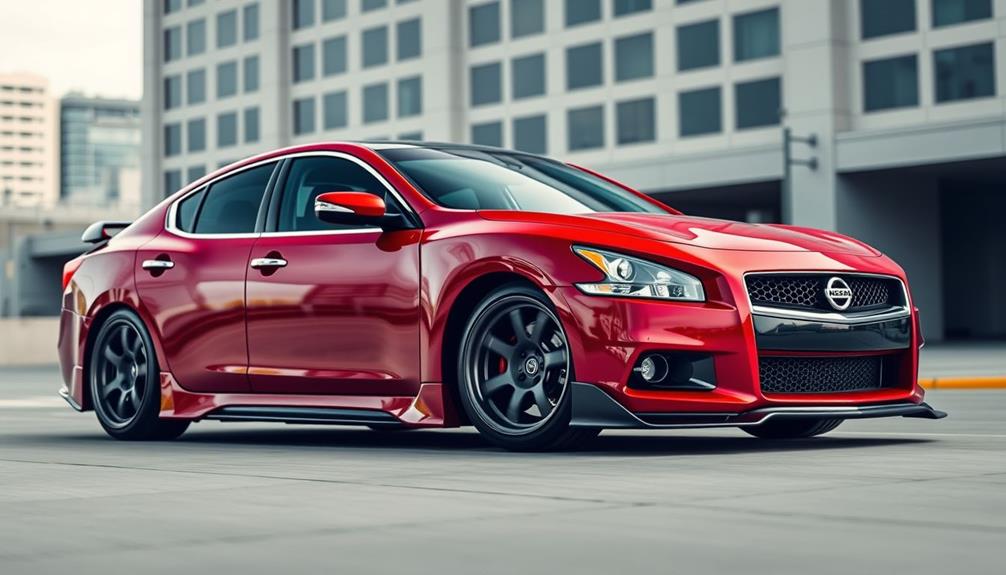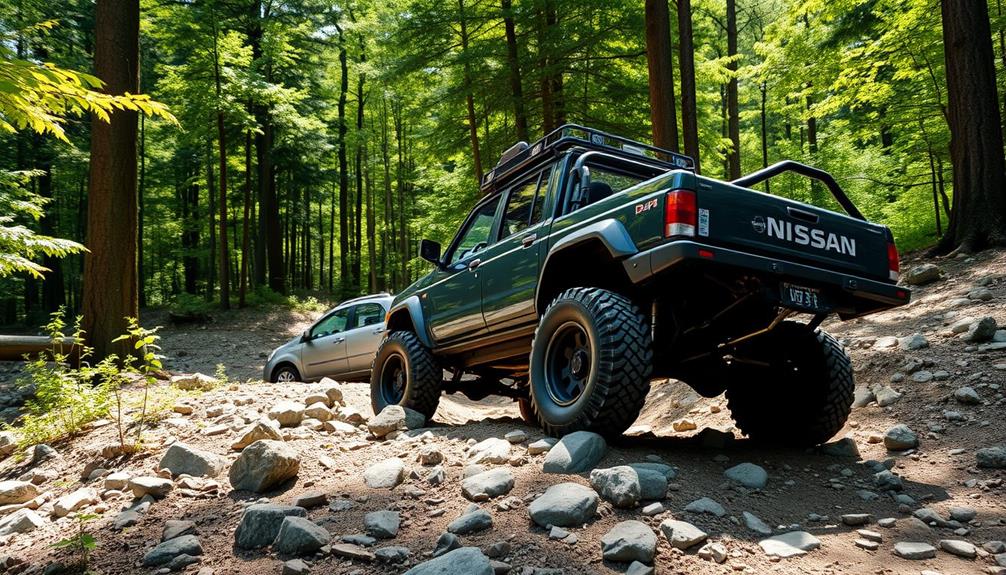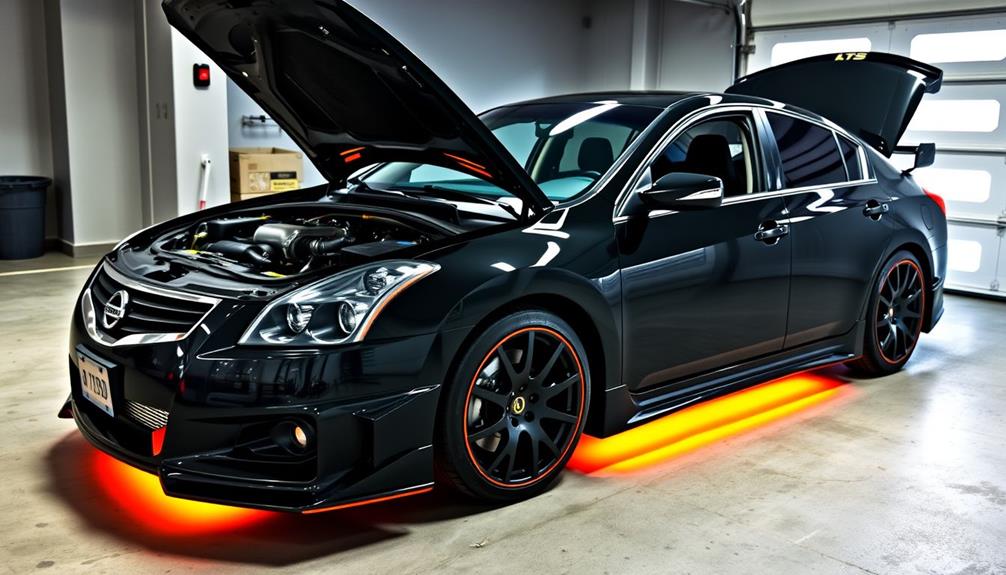Tuning your 2007 Porsche Cayenne can release its hidden potential, transforming it from a luxury SUV into a remarkable performance powerhouse. You can achieve power gains of up to 570 HP with modifications like an ECU tune and high-performance downpipes. Your Cayenne will handle better with an improved power-to-weight ratio and an engaging driving experience. While the costs can range from $5,000 to over $20,000, the effects on performance and efficiency are often worth it. There's a lot more to evaluate, including specific products and packages that can elevate your ride.
Key Takeaways
- Tuning your 2007 Cayenne can boost horsepower to 570 HP and torque to 857 ft-lbs, enhancing overall performance.
- Upgrading to high-performance downpipes and intercoolers can yield additional horsepower and improve throttle response.
- An ECU tune can cost around $2,500, providing significant power gains while optimizing engine performance.
- Addressing wastegate issues early ensures better boost control and prevents engine damage during tuning.
- Comprehensive performance packages, such as those from Fabspeed, enhance sound, efficiency, and driving experience for your luxury SUV.
Overview of the 2007 Cayenne
The 2007 Porsche Cayenne embodies a perfect blend of luxury and performance, making it a standout in the SUV market. Under the hood, you'll find a robust 4.8-liter V8 engine that delivers an impressive 400 horsepower and 369 pound-feet of torque. This power allows for remarkable acceleration and a towing capacity of up to 7,700 pounds, perfect for those with adventurous lifestyles.
If you're seeking even more performance, the Porsche Cayenne Turbo variant ramps things up with a thrilling 500 horsepower, enabling you to sprint from 0 to 60 mph in just 4.9 seconds. The all-wheel-drive system and advanced air suspension enhance both on-road handling and off-road capabilities, ensuring a smooth ride no matter where you go.
Step inside, and you're greeted by a luxurious interior featuring high-quality materials and advanced technology, including a premium audio system and navigation options.
The Cayenne's design showcases Porsche's commitment to luxury while delivering exceptional performance, making this SUV not just a means of transportation but a statement of style and capability.
Benefits of Tuning Your Cayenne
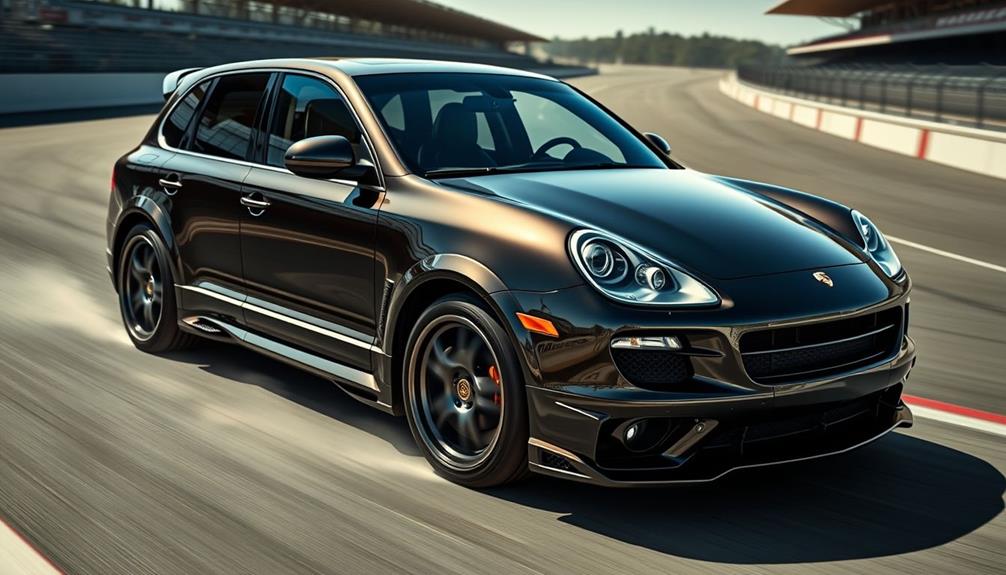
Tuning your 2007 Porsche Cayenne opens up a world of enhanced performance and driving pleasure. By investing in modifications like ECU tuning, you can access significant power gains, boosting your SUV's output to an impressive 560-570 HP. This transformation not only improves throttle response but also enhances torque delivery, making your Cayenne feel more agile and responsive on the road.
Here's a quick look at some key benefits of tuning:
| Benefit | Description |
|---|---|
| Power Gains | Achieve up to 570 HP with tuning modifications. |
| Torque Improvement | Enhanced tuning can yield up to 857 ft-lbs. |
| Better Fuel Efficiency | Optimized engine performance can improve mileage. |
| Improved Handling | Better power-to-weight ratio for sporty handling. |
| Enhanced Driving Experience | Enjoy a more engaging ride with improved exhaust sound. |
These upgrades not only elevate your Cayenne’s performance but also enhance its fuel efficiency, giving you a thrilling driving experience without sacrificing practicality. Embrace the potential of your luxury SUV and feel the difference tuning can make! Looking for Porsche Cayenne tuning tips? Consider consulting with a professional tuner who can provide personalized advice based on your specific vehicle and driving preferences. Additionally, researching reputable aftermarket parts and performance upgrades can help you make informed decisions about enhancing your Cayenne’s capabilities. With the right modifications, you can truly unlock the full potential of your luxury SUV and enjoy an exhilarating driving experience.
Performance Modification Options
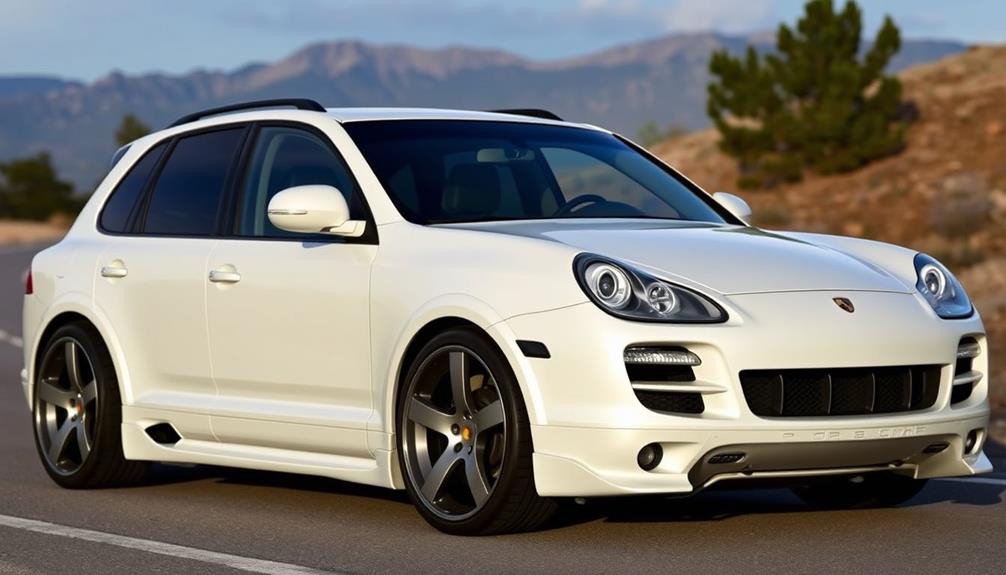
Considering performance modification options for your 2007 Porsche Cayenne can greatly enhance its capabilities on the road. One of the most impactful upgrades is an ECU tune. This typically costs around $2,500 and can boost your horsepower by approximately 40-60 HP when done right.
If you're looking to take it a step further, consider adding high-performance downpipes and intercoolers to improve exhaust flow and cooling efficiency. These upgrades can provide an additional 20-30 HP.
Installing a thorough performance package, such as those offered by Fabspeed, can greatly elevate your vehicle's performance. Expect to spend between $4,410 and $5,948 for these enhancements.
Additionally, a cat bypass pipe can remove restrictions in your exhaust system, enhancing both sound and performance, with costs around $1,035 for secondary competition link pipes.
While these modifications can yield impressive results, keep in mind the total investment often exceeds $20,000. You'll want to weigh the benefits against the modest power gains and consider how this affects your vehicle's overall value.
Ultimately, choose modifications that align with your performance goals while maintaining a balance between cost and gain.
Cost Analysis of Upgrades

When considering upgrades for your 2007 Porsche Cayenne, it's essential to weigh the investment against the potential performance gains.
While you might be tempted by impressive horsepower numbers, the heavy nature of the vehicle can limit the impact of these modifications.
Additionally, factoring in maintenance costs might lead you to prioritize care over extensive tuning, ensuring better long-term value.
Investment Vs. Performance Gains
Investing in performance upgrades for your 2007 Porsche Cayenne can feel like a double-edged sword, balancing the desire for enhanced driving dynamics with the reality of considerable costs.
You might be tempted by the allure of tuning and exhaust systems, but the financial outlay can range from $5,000 to over $20,000.
When you consider your luxury SUV's original price of around $130,000 has depreciated to approximately $15,000 over 11 years, you need to question whether such an investment is justified.
Before diving into upgrades, think about these factors:
- Realistic Performance Gains: Tuning a Cayenne Turbo S could yield 560-570 HP, yet this modest power-to-weight improvement mightn't transform your driving experience greatly.
- High Costs vs. Value Retention: Many owners find that the money spent on performance enhancements doesn't correlate with increased vehicle value.
- Maintenance Over Upgrades: Given the high maintenance costs of older models, you might be better off allocating funds to upkeep rather than performance upgrades.
Ultimately, weigh your options carefully to verify your investment yields worthwhile returns.
Maintenance Cost Considerations
Regularly evaluating the maintenance costs of your 2007 Porsche Cayenne is vital, especially when contemplating performance upgrades. While tuning your Cayenne can elevate its performance, it often requires a substantial investment. Basic tuning might run you about $2,500, with additional modifications, like secondary cat bypass pipes, costing around $500.
Extensive performance packages can soar past $20,000, which raises questions about their justifiability, given your vehicle's depreciated value of around $15,000.
Remember, performance upgrades typically yield modest horsepower gains—tuning a Cayenne Turbo might only boost power to 560-570 HP. Given the SUV's heavy weight, this mightn't drastically enhance your driving experience.
Prioritizing preventative maintenance is important; high maintenance costs are common in older models, and extensive modifications mightn't offer a good return on investment.
It's wise to build a self-insurance fund for unexpected repairs, as maintenance and repair costs can add up quickly. By focusing on maintaining your Cayenne in ideal condition, you can guarantee your investment pays off while enjoying the luxury and performance it was designed to deliver.
Fuel Efficiency Considerations
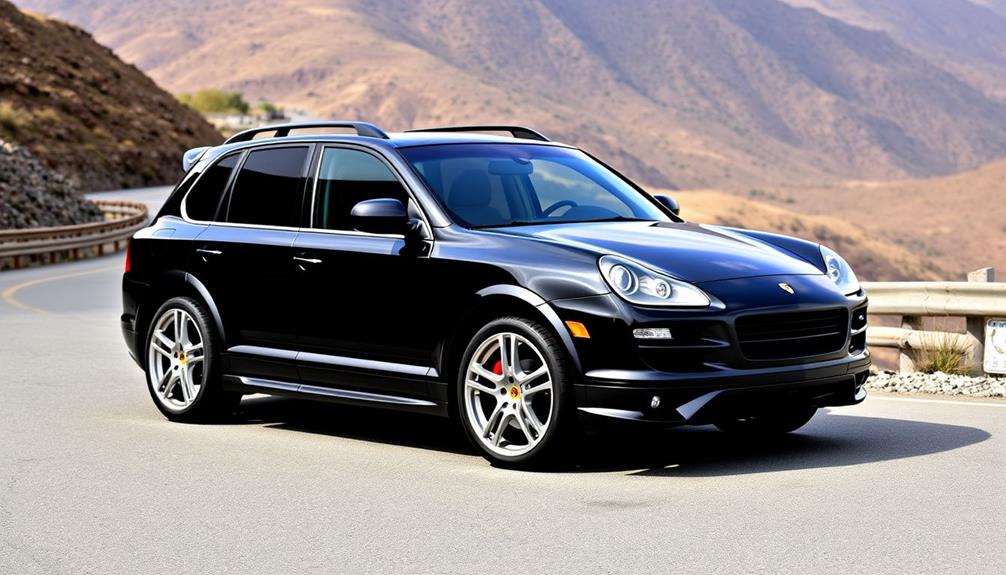
Fuel efficiency is a significant consideration for Porsche Cayenne owners, especially with rising fuel costs averaging around $6.80 per gallon in Europe.
While tuning can enhance performance, it's important to weigh its impact on fuel economy.
Here are some key points to take into account:
- Installing an LPG system can reduce fuel costs by approximately 50%, making it a more economical option.
- Real-world fuel efficiency gains from tuning often fall short of expectations, as modifications may not greatly alter consumption patterns.
- Basic tuning packages can cost around $2,500, and the return on investment regarding fuel efficiency might be minimal.
As you explore tuning options, keep in mind that the immediate benefits of enhanced performance mightn't align with your fuel efficiency goals.
Long-term fuel economy enhancements can take years to realize, suggesting that focusing on maintenance could be a more prudent financial decision.
Ultimately, it's important to strike a balance between performance upgrades and fuel economy to guarantee that your Cayenne remains a luxurious yet efficient vehicle on the road.
Technical Challenges in Tuning
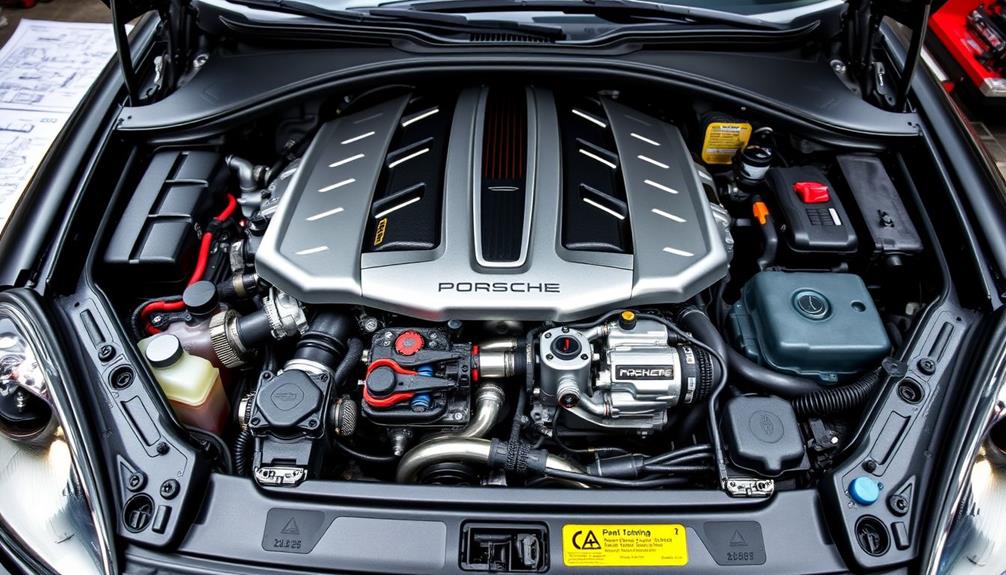
When tuning your 2007 Porsche Cayenne, you'll face several technical challenges, including boost creep issues stemming from the internal wastegate setup.
Limited aftermarket support can make it tough to find compatible parts, pushing you to contemplate custom solutions.
It's crucial to navigate these hurdles carefully to guarantee your modifications lead to the desired performance without compromising reliability.
Boost Creep Issues
Boost creep issues can be a significant hurdle in tuning the 2007 Porsche Cayenne Turbo, especially due to its hefty weight and the limitations of its internal wastegate setup.
When you're pushing for more power through performance enhancements, you might unintentionally exacerbate these problems. As boost pressure rises uncontrollably beyond target levels, you'll face potential risks like engine damage or reduced reliability.
To effectively manage boost creep, consider the following strategies:
- Upgrade to external wastegates for better control over boost levels.
- Optimize your turbo setup to guarantee balanced airflow and pressure regulation.
- Thoroughly understand the Cayenne Turbo's turbo system to implement safe tuning practices.
Ignoring boost creep can lead to serious consequences, so it's vital to address these issues head-on.
By investing in the right tuning solutions and modifications, you can harness the true potential of your Cayenne Turbo without compromising its performance.
Wastegate Setup Challenges
While tuning your 2007 Porsche Cayenne Turbo, you'll quickly realize that the wastegate setup presents several technical challenges that can complicate your performance goals. The factory internal wastegates often struggle to manage boost pressure effectively, especially when you're pushing for higher power levels. This can lead to boost creep, where your boost pressure exceeds safe limits, risking engine damage.
Modifying the wastegate system is vital, but improper setup can create inconsistent boost levels, further complicating your tuning efforts. Many tuners recommend considering aftermarket or external wastegate options for better control and tuning flexibility. However, achieving peak performance gains requires careful calibration of the wastegate to match your engine's tuning changes, which can be intimidating without the right technical know-how.
Addressing wastegate issues early in the tuning process is significant. Failing to do so can result in costly repairs down the line, undermining your performance aspirations.
Limited Aftermarket Support
Tuning the 2007 Porsche Cayenne Turbo can be particularly frustrating due to the limited aftermarket support available. Unlike other performance vehicles, finding parts specifically designed for your Cayenne's enhancements can be a challenge. Most modifications, like downpipes and ECU tunes, lack extensive dyno data, leaving you uncertain about the performance outcomes.
Here are some significant considerations for tuning your Cayenne:
- Technical Expertise: A thorough understanding of engine management and turbo systems is essential.
- Performance Gains: The heavy nature of the Cayenne can limit the effectiveness of your tuning efforts.
- Potential Risks: Improper tuning can lead to recurring issues and reduced performance.
Experienced tuners often stress the importance of maneuvering through these challenges effectively. With the Cayenne's twin turbo setup, achieving substantial power gains requires careful planning and execution.
The limited aftermarket options mean you must rely on your technical knowledge and research to make informed decisions. Ultimately, while tuning your Cayenne can be rewarding, the unique challenges presented by its aftermarket landscape make the journey more complex than that of other vehicles.
Community Insights and Experiences

Sharing experiences within the Cayenne community reveals a wealth of insights that can guide both new and seasoned owners. Many enthusiasts stress the importance of understanding the costs and expected results of tuning before making any investments. You might find that potential performance gains can be minimal compared to the financial outlay, so it's wise to do your homework.
Experienced members often advocate for prioritizing preventative maintenance over extensive modifications, ensuring your vehicle remains reliable and long-lasting. Discrepancies in power gain expectations versus actual results are common, especially among new owners who may not grasp the complexities of tuning. Engaging in forum discussions can help you align your expectations with reality.
If you own a Cayenne Turbo, be prepared for limited aftermarket support. It's essential to consult knowledgeable tuners for effective modifications, particularly when it comes to performance ECU upgrades.
Additionally, building a self-insurance fund for unexpected maintenance expenses is frequently recommended by community members, reflecting the high repair costs associated with older luxury SUVs like the Cayenne. Embracing these insights can lead to a more fulfilling ownership experience.
Recommended Products and Packages

If you're looking to enhance your 2007 Porsche Cayenne's performance, several recommended products and packages can help you achieve impressive results.
Whether you want more power, improved engine response, or an exhilarating driving experience, these options are worth considering.
- Fabspeed Porsche 955 S Performance Package: Priced between $4,410.85 to $5,947.80, this package offers significant performance enhancements, perfect for power-hungry drivers.
- Cat Bypass Pipes: For around $1,035.95, these pipes increase exhaust flow and deliver a more aggressive sound, elevating your Cayenne's presence on the road.
- ECU Tune (IE Performance): By installing an ECU tune, you can elevate your Cayenne Turbo's output to a staggering 692-857 HP, depending on the fuel octane levels utilized.
Additionally, consider thorough performance packages that include downpipes and intercoolers.
These upgrades not only improve throttle response but also enhance overall driveability, ensuring your Cayenne's engine performs at its peak.
With these recommended products, you'll transform your luxury SUV into a performance powerhouse that will leave a lasting impression.
Future of Cayenne Performance
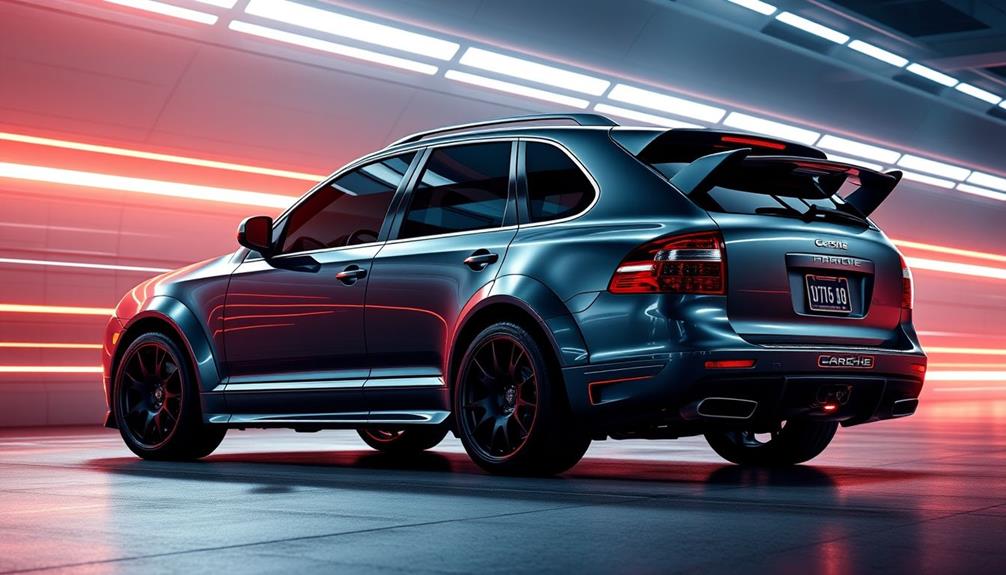
As you explore the future of Cayenne performance, it's clear that the focus is shifting towards hybrid and electric powertrains. This change aligns with the automotive industry's push for sustainability and efficiency, promising impressive advancements for models like the Cayenne S.
Expect enhanced maximum power and improved performance through innovative technologies.
With the introduction of advanced ECU tuning options, you could see gains of up to 857 HP for the Cayenne Turbo/GTS 4.0T V8, making it an exciting prospect for performance enthusiasts.
Additionally, lightweight materials in newer Cayenne generations have already proven to enhance acceleration by reducing weight—recent models are about 500 lbs lighter, which greatly improves power-to-weight ratios.
Driver assistance systems and adaptive technologies, such as Porsche Dynamic Chassis Control and InnoDrive, will further enhance driving dynamics, allowing you to enjoy a more connected experience behind the wheel.
Plus, with continuous improvements in aftermarket support, many tuning packages can exceed 20% power increases, empowering you to customize your Cayenne for peak performance.
And don't forget, many of these tuning solutions come with free updates, ensuring your investment stays relevant in the fast-evolving automotive landscape.
Frequently Asked Questions
Can a Porsche Cayenne Be Tuned?
Yes, you can tune a Porsche Cayenne. By exploring various aftermarket options like ECU remapping, exhaust upgrades, and intake enhancements, you'll greatly boost its performance. Just remember to take into account maintenance alongside your tuning investments for lasting benefits.
What Is the Most Powerful Engine in Porsche Cayenne?
The most powerful engine in the Porsche Cayenne lineup is the 4.8-liter twin-turbo V8 in the Turbo S variant, cranking out 570 horsepower and 590 lb-ft of torque, delivering exhilarating performance on the road.
How to Raise Porsche Cayenne?
To raise your Porsche Cayenne's performance, consider ECU tuning, upgrading the exhaust system, and adding downpipes. Enhance handling with upgraded suspension and explore water/methanol injection for increased horsepower. You'll feel the difference on the road.
Is Porsche Cayenne a Super Suv?
Yes, you can definitely consider the Porsche Cayenne a super SUV. Its blend of luxury, advanced technology, and impressive performance metrics make it a standout choice in the competitive luxury SUV market.
Conclusion
In summary, tuning your 2007 Porsche Cayenne can turn your luxury SUV into a roaring beast on the road. With the right modifications, you'll not only enhance performance but also enjoy a more exhilarating driving experience. While challenges may arise, the rewards are well worth the effort. So, why not release the potential of your Cayenne and let it roar like a lion? With a little investment and creativity, your SUV can truly shine.



